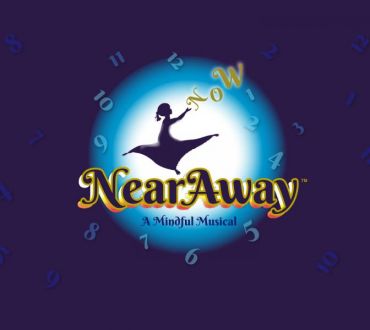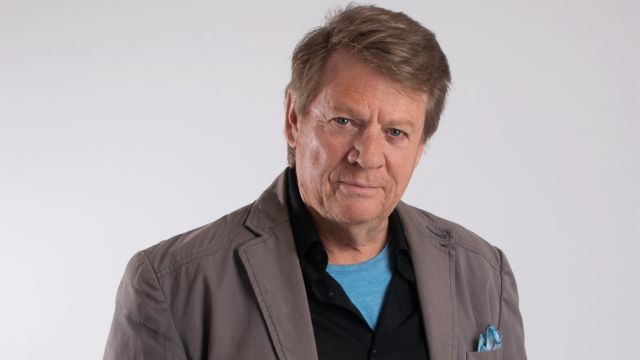NearAway
Australia’s new ‘mindful musical’ to empower young theatre makers around the world
Clayton Sinclair has dedicated his life to storytelling. A writer, director, actor, singer, composer, producer and mindfulness coach, Sinclair believes in the power of great stories to educate, awaken, inspire and empower. Geoffrey Williams recently caught up with him to discuss his newest project – the “world’s first mindful musical” NearAway. His hopes for Australia’s newest musical? To offer young theatre makers and audiences a healing elixir in a world struggling for answers to increasingly complex questions.
Inspired by Eckhart Tolle’s The Power of Now, NearAway follows an orphaned girl who, on her 11th birthday, wishes to undo a terrible curse. But her wish gets tangled in a dark thought, and she’s swept into a shadowy realm. To escape, she must journey a strange and treacherous path to a place called NearAway, where the light of presence might just lead her home.
Described by Sinclair as “a Wizard of Oz type fable for our time”, NearAway is a roller coaster adventure ride, with Sinclair’s signature catchy tunes and zany characters. NearAway also combines unique and practical mindfulness tools throughout the journey to provide audiences of all ages with genuine support and experience relating directly to how it feels to use NearAway’s inspirational score and libretto to find peace of mind in a troubled world.
GW: Can you share the first theatrical experience you remember having an impact on your life?
CS: My first experience of theatre came as a child when I was performing in my local primary school’s end-of-year production. Having been blessed with quite a good singing voice and an outgoing personality, being on stage made a connection with me unlike anything else I had ever experienced. It made me feel more alive.
How has storytelling and theatre informed your life?
The grand theme of ‘What is it like to feel more alive?’ was not a theme we examined or discussed openly at school – but I could hear whispers of it in within theatre, film and storytelling generally – where the human condition would be examined through a hero or heroine’s journey and values would be held up to the light of truth. This is what inspired me as a young man to identify what was missing in our cultural stories.
Are there lifelong friendships you have made through your love of storytelling and theatre?
When I first joined the William Bates Academy of Acting in Melbourne as a naive young man, I immediately realised that I had found my ‘tribe’. William had a gift for developing the potential in his students. He was intelligent, sophisticated, and kind, and he spoke to the part of me that needed a friend in a world that seemed mostly cold and uninteresting.
His belief was that to be a good actor, you needed to make your life a study of human behaviour … and this is what I would go on to do. We would discuss many things in life from politics, philosophy and religion, to love and sexuality – all in great depth and at a time when I needed it the most. And from these discussions, we would explore topics for improvisation classes with all my newfound thespian buddies.
I loved it all, and before long I was at the academy studying, working at my craft, and performing seven days a week. Here I would witness the most incredible transformation and awakening of human potential in practically every student. We all became lifelong friends, and through this experience I promised myself that, like William Bates, I would dedicate part of my life to the quest of assisting others to find their potential.
What is the highlight of your storytelling and theatrical life?
As a fourteen year old I remember coming home from school to find out that I had been published in the ‘Mere Male’ section of my mother’s favourite magazine, New Idea. This was where women could write in humorous stories about their experiences with the men in their lives. I shamelessly figured out this would pay better than my paper round, so I read a few of the paragraphs and worked out what they wanted, and I would make up stories and send them off using my mother’s name as my nom de plume. When the money orders arrived in the mail, my mother would endorse them for me to cash. This always brought a smile to her face … which delighted me, because my mother had often struggled to find happiness.
Another wonderful moment was when I realised I could compose music and write lyrics … but I wasn’t impressed by myself. It came so easily to me that I thought anyone must be able to do it. I headed off to New York and found a music manager and record producer who liked my songs. He had worked with many famous artists including Elvis Presley, so I was quite thrilled to have his involvement. We released several records and even got airplay in some parts of the world too … not enough to make us rich and famous, but it was all great experience. My single In Saigon was put on the rare Vietnam War list alongside Simon and Garfunkel and Bruce Springsteen.
 What strategies have you used to overcome the challenges throughout your life in the theatre?
What strategies have you used to overcome the challenges throughout your life in the theatre?
One of the challenges I had to face (like most of us in the performing arts), was how to stay alive financially between gigs, so I decided on a wing and a prayer to set up a television production company. We began to produce corporate videos, jingles, video clips and even those nasty late-night television commercials, and we became quite successful. I also took on clients as a speech therapist and later a mindfulness coach.
My interest in the human condition had led me to seek out transformative books by those who had already travelled similar roads. My reading list includes the ‘Power of Now’ and ‘A New Earth’, both by Eckhart Tolle, ‘The 8th Habit’ by Stephen R Covey, and ‘Now Discover Your Strengths’ by Don Clifton and Marcus Buckingham.
Who inspires you – in storytelling, theatre, or life more generally?
Inspired by what I had learned from these writers and many others, I realised there was a huge opportunity to expose these transformative life skills through the medium of theatre and film to those who were not likely to seek out professional help or even buy a self-improvement book, but would surely benefit from the knowledge – particularly those who were suffering from mental health challenges.
From this inspiration came the idea for NearAway, which recently had its first reading at The National Theatre in Melbourne. It was a big hit among the acting students at The National, but more importantly, one of the actors offered that she wished it had been around for her when she was struggling through a difficult patch in her life when she was around 12. I told her I wished it had been around for me too – and now it is!
Why is mindfulness in our lives so important?
Mindfulness helps us to observe our thoughts and feelings without judgement, allowing us to detach from the cycle of worry and reactivity. It can offer many benefits for mental and physical wellbeing. It can also help reduce stress, anxiety and depression, and it can improve sleep and enhance focus – all things that I have found immensely useful in my life. And NearAway has become a rewarding, joyful vehicle to share what I have learned with the world.
What are your hopes for the project?
Our hope for the NearAway project is that it will provide insights into the real experience of how it feels to find joy and peace of mind in a troubled world to as many young theatre makers and their audiences around Australia and the world as possible.
To learn more about how your school or theatre company can become involved with Clayton Sinclair’s magical, musical NearAway project – visit https://www.nearawayproject.com
Images: Clayton Sinclair photographed by Jay Penfold and (lower) The NearAway project’s evocative lead visual identity design by Jane D Thornton.
Subscribe to our E-Newsletter, buy our latest print edition or find a Performing Arts book at Book Nook.

